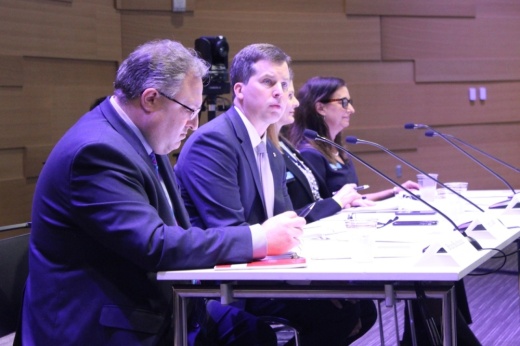Canally had been serving as the ATP's interim director since the departure of its former leader Randy Clarke last year. The appointment is for three one-year terms, and Canally will start earning a $365,000 salary as well as other benefits with yearly pay increases in line with other ATP staff.
The ATP's leadership move came around one month after the board of Capital Metro, the regional transportation authority behind Project Connect, similarly voted to appoint its interim head Dottie Watkins as the agency's president and CEO. Watkins had also been serving in that role since Clarke's departure.
Despite his longtime involvement with Project Connect and the ATP, Canally's appointment generated some unease from community members monitoring the process in recent weeks.
While expressing support for Canally and his work with Project Connect so far, multiple community members and groups such as Transit Forward and the ATX Mobility Coalition shared commentary raising concerns about the ATP's governance and how the board arrived at its decision.
Appointment process
The ATP's announcement of Canally as the sole finalist for the director position in late January jolted some who said the transit entity's board was moving ahead without properly consulting with Austinites.
Representing the mobility coalition, João Paolo Connolly said some observers believed the board was pressing forward on Canally's appointment following a “misunderstanding, a violation or a bad-faith interpretation” of the agreement covering Project Connect and related community involvement.
ATP board Chair Veronica Castro de Barrera released a statement soon after that January meeting, clarifying no final decision had been made, and on March 1 detailed several community meetings and other engagement efforts by the ATP that took place over the past month. However, Connolly said that “the damage, to some extent, was already done.”
“The community was led to believe that the board selected Mr. Canally as a sole candidate without a good-faith attempt at upholding its joint powers agreement,” he said. “This has shaken public trust in the board of the Austin Transit Partnership and has exposed the project to risk at a crucial moment in which board members should be making every effort to build and project community trust.”
Board member Tony Elkins voiced similar concerns, saying he believes the ATP kept the community in the dark.
“Transparency builds trust. I believe we’ve lost some trust ... in the community through this process, and we must rebuild that trust," he said.
The Project Connect Community Advisory Committee, a resident monitor group, also acknowledged Canally as a “strong candidate” for the job but said the selection process raised “serious concerns” about the ATP's transparency and decision-making in a Feb. 20 letter. The CAC unanimously forwarded its letter to the ATP board last month with several requests regarding public relations and overall transparency.
Speaking to the ATP board March 1, CAC Chair Awais Azhar said the committee still supported Canally and Watkins despite reservations about how they landed in their permanent roles.
“Hopefully we can all continue together forward, but we can also work in a way that really builds trust with the community," Azhar said.
In the end, Canally was appointed without opposition March 1. Castro de Barrera said she appreciated the community calling out perceived issues and committed to improved public processes by the ATP going forward.
“I recognize that the announcement made in January was not only received with joy and with some elements of surprise, but also with some confusion that fragmented the trust of our community. I want to take this opportunity to apologize for how the statements made by this board in January caused harm," she said prior to the vote.
Where is Project Connect?
The Project Connect system outlined after voters approved CapMetro's multibillion-dollar transit initiative in November 2020 could be scaled back or adjusted months after planners shared details on the rising costs of implementing the plan. An update on the scope of Project Connect's rail lines is expected this spring.
Ahead of that announcement, CapMetro recently shared one portion of Project Connect—its MetroRapid bus routes on Austin's east side—will not launch this summer as originally intended. Instead, Watkins said in February that a variety of unanticipated challenges mean the new electric bus routes will be delayed until 2025.
CapMetro broke ground on the MetroRapid Expo Center line in late 2021 and the Pleasant Valley line in early 2022, and station construction has continued since then. Until recently, CapMetro had still expected the bus lines would be operational this year.
With significant decisions on Project Connect's next steps on the horizon, Connolly said transit leaders must continue to open the door to community members following questions about the recent processes.
“What we saw were some decisions ... that didn’t really follow those commitments around the timeline, around the public notice, around the time to engage, and so on and so forth,” he said. “Now we have ... decisions that will impact transit riders, bus users, working-class people in this city much more directly. And those decisions, we request that this board uphold the commitments to giving the community the time to engage meaningfully with those decisions.”





